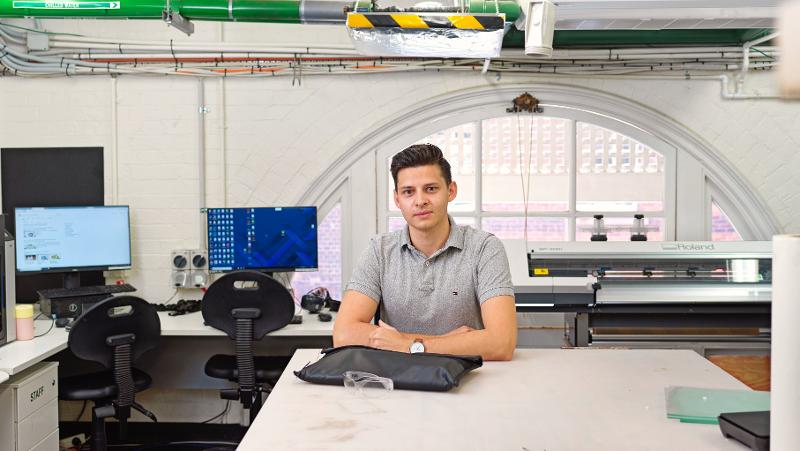
After completing an internship at the BMW group in Munich in 2016, Dylan Sheppard has developed his passion for design technology, forging his path to a dream design job with the global car giant.
The QUT alumnus who now leads the design team at idealworks took a moment to answer our questions about innovation, partnerships and ‘the next big thing’ in the automotive and robotics industry.
What is your role at idealworks and how are you involved in the BMW partnership with QUT?
I’m currently running the digital design team at idealworks, where I focus on user experience design and building our simulation pipeline for robotics development. During my studies in industrial design at QUT, I completed an internship at the BMW Group in Munich, and later accepted an opportunity to return to BMW for a full-time position. Things have come full circle, as I’m now working with QUT and the departments throughout the BMW Group to match QUT students with placement opportunities.
In your opinion, what are the key elements of a successful business partnership?
First off, it must be mutually beneficial. The time, money, and energy required to build a meaningful partnership can only be sustained when both parties are getting something back in return. For BMW Group and QUT, students gain practical experience at an industry leading company, and BMW Group can garner top talent – a win-win.
Supportive leadership is also critical to building long term partnerships. Sometimes all it takes is an email or signature from above! Lastly, individual champions of a partnership program are probably the most important part of ensuring success in the long term – these kind of partnerships are only possible when motivated and passionate individuals are committed to the success of the program and willing to put in the work to make it happen.
What advice would you give to alumni and corporates wanting to explore a partnership with QUT?
Identify a niche and find your champion. For BMW, we found a clear niche within QUT’s design program and developed a good fit between student skillsets and active projects. Four years into the program and we’re fielding requests from BMW teams asking specifically for QUT design students for projects, which is great to see. Second, it's important to identify key individuals from faculty to support the partnership from inside. We’re lucky in design to have great support from the team, who are promoting their best students and our programs.
What is one innovation in your industry or elsewhere that you think will be the ‘next big thing’?
I think the next big thing is a combination of two things; interoperability and consolidation of technologies. With 3D workflows, interoperability is becoming a huge topic as it enables companies like BMW Group to connect work spanning thousands of employees and unify global offices through open-source formats and interchangeable file types.
For robotics, interoperability between interfaces and hardware is helping businesses connect complex systems and consolidate interactions for the end user. The bad old days of siloed technologies and locked-in product ecosystems are gradually coming to an end, which is already proving to be extremely impactful in a lot of industries.
What is one skill you couldn’t live without, and which you believe everyone should have?
One essential skill for me and my career has been information synthesis; working in a constantly changing field and across a broad range of topics, it’s never been more important to be aware of what's happing around me and how it can be leveraged to drive innovation. Some of my best work to date has come from combining technologies and principles from other industries and using these ideas in new and interesting applications.
How did your QUT degree impact your career journey?
The skills and network developed while studying at QUT helped launch my experiences in Germany and ultimately prepared me for a career in the industry. The broad skillset and diverse knowledge gained from the QUT ID program was extremely beneficial in breaking into emerging tech and helped me to apply creative thinking to complex technical problems.
Do you have any advice that you would like to share with current students?
The best advice I can give to current students is to go out there and get it. Internships, WIL placements, and industry events – these opportunities are key to building a network in industry and in my own career path were essential to forming long-term relationships that led to further opportunities.


